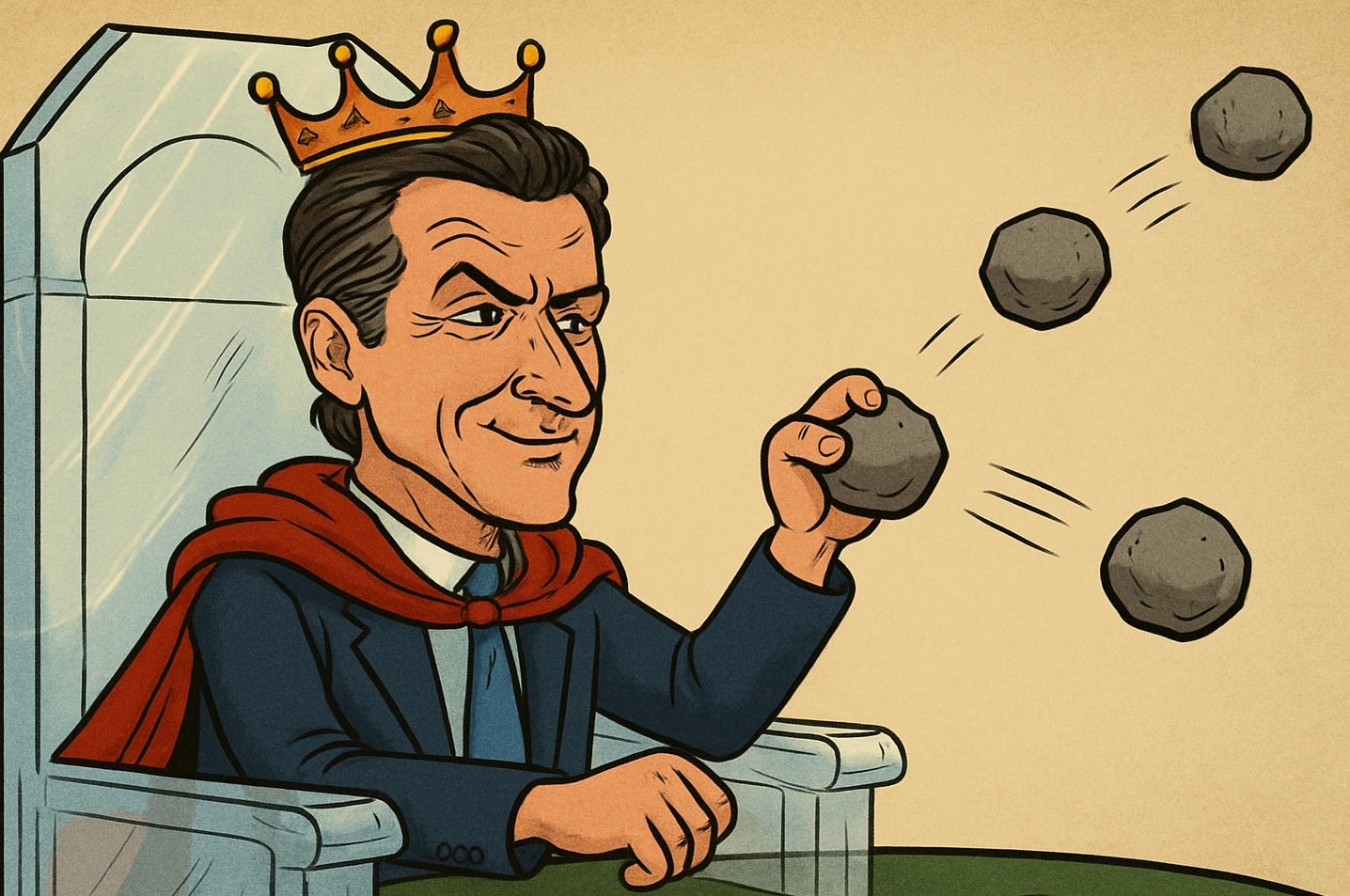“King Gavin” Throws Stones From His Glass Throne
The Governor Who Calls Trump “Authoritarian” Needs To Look In A Mirror…
Newsom’s Nifty Narrative
Gavin Newsom loves to play the role of democracy’s defender. Lately, he’s been all over the news, positioning himself as Trump’s polar opposite—the reasonable Democrat standing up to what he calls authoritarian overreach. In his recent speeches, he’s warned about threats to our democratic institutions, particularly criticizing Trump’s federal intervention in Los Angeles as executive overreach run amok.
Newsom loves to tell his narrative, where he is the principled leader protecting California from federal tyranny, who puts democratic values above political convenience. There’s one problem with this story: it’s complete hooey when you look at his track record.
When Voters Don’t Matter
Let me take you back to 2016. California voters had a choice to make about the death penalty. They could either keep it (with some reforms to speed up the appeals process) or eliminate it. The results weren’t even close—they chose to keep it, approving Proposition 66 to streamline the system while soundly rejecting Proposition 62, which would have abolished capital punishment altogether.
Two years later, those same voters elected Newsom as governor. Did he respect their clear decision on the death penalty? Of course not. In March 2019, just a few months into his term, Newsom issued an executive order putting a moratorium on all executions. Just like that, hundreds of death row inmates got a reprieve that voters never approved.
Think about that for a second. The people of California went to the polls, looked at this exact issue, and made their choice. Newsom said, “Thanks, but I know better.”
The Case That Voters Made
Now, I get it—the death penalty is complicated. Reasonable people can disagree, and there are legitimate arguments on both sides. Some studies suggest it might deter crime, though experts still argue about that. What’s not debatable is that families of murder victims often find some measure of peace knowing their loved one’s killer will face the ultimate punishment.
The Supreme Court settled the constitutional question in 1976 with Gregg v. Georgia—when applied fairly, capital punishment doesn’t violate the Eighth Amendment. Recent polls still show plenty of Americans support it for the worst crimes. California voters weren’t making their decision in a vacuum.
The Other Side of the Story
Of course, death penalty opponents make valid points, too. The Innocence Project has freed dozens of people who were wrongly sentenced to death, including several right here in California. That’s terrifying to think about. And let’s be honest—California’s death penalty system has been expensive and inefficient. We’ve spent billions over decades while barely carrying out any executions. Former Governor Jerry Brown and others argue that life without parole accomplishes the same goal without the risk of executing an innocent person. And there is the philosophical question about whether government, for any reason, should take a human life.
The Real Irony
But here’s what drives me crazy about Newsom’s positioning: if you want to see actual authoritarian behavior, look in the mirror, Governor.
What exactly do you call it when an elected official uses executive power to overturn a decision that voters just made? Because that’s precisely what happened with the death penalty moratorium. California voters said one thing in 2016, and Newsom said “nope” in 2019.
Meanwhile, this same guy is on TV every other week calling Trump authoritarian for using executive authority. The lack of self-awareness is stunning. When Newsom throws around words like “authoritarian” and “anti-democratic,” maybe he should remember that time he decided California voters didn’t know what they were talking about.
The Bigger Picture
This isn’t about the death penalty, though that’s a legitimate policy debate. This is about a politician who’s built his brand on defending democracy while practicing something that looks suspiciously like the opposite.
When you ignore clear voter decisions because you think you know better, that’s not moral leadership—that’s arrogance. When you use executive power to override the democratic process, you don’t get to lecture others about respecting democratic institutions.
Newsom wants to be seen as the reasonable alternative to federal overreach. But voters might start wondering: what’s the difference between leaders who ignore the democratic process they claim to defend?
The answer should be that there shouldn’t be one. Power without accountability is dangerous regardless of which party wields it. California voters made their voices heard on capital punishment, and their governor decided those voices didn’t matter.
A Pattern of Executive Overreach
And let’s not forget—this is the same governor who shut down entire industries and all of California’s schools during COVID, closed beaches and playgrounds, and banned outdoor dining while he dined maskless at the French Laundry. When Newsom decides something needs to happen, democratic input becomes optional. The death penalty moratorium was just another example of his “I know what’s best for you” approach to governance. Who is the authoritarian?
“King Gavin” is throwing rocks from his own glass throne.



